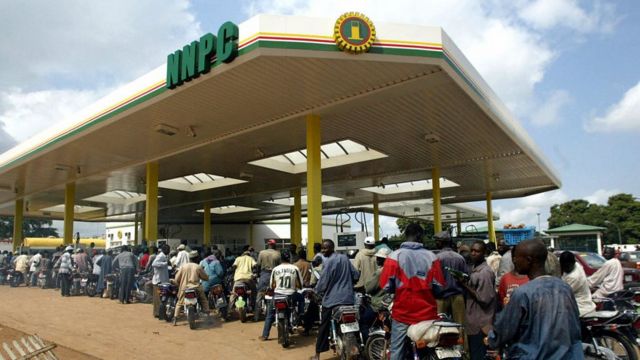Filling station owners are currently in panic buying mood, as many of them are stockpiling products ahead of the announcement of a new pump price for petrol in August, investigation has shown.
It was also gathered that the price of the commodity might increase to about N150/litre as the committee saddled with the task of fixing petrol price had been meeting and would make the new price public soon.
Marketers and officials of the Petroleum Products Pricing Regulatory Agency told our correspondent in Abuja on Sunday that the rise in crude oil price in the international market could lead to an increase in petrol price.
They noted that since March this year, the cost of Premium Motor Spirit, popularly called petrol, had always been adjusted based on the global prices of crude oil.
“There is panic buying and it is because of the worry that prices will be reviewed either downwards or upwards. But because of the marginal rise in crude oil prices, the calculation is that petrol price could go up,” the National President, Petroleum Products Retail Outlets Owners Association of Nigeria, Billy Gillis-Harry, said.
He added, “That is the situation and this was why we requested that there should be a stakeholders’ engagement every month or quarterly so that we can be sure of what to expect.”
He said many marketers who had stockpiled products were ready to sell at the current rate regardless of any increase.
Gillis-Harry noted that the failure of the pricing regulator to involve marketers in the price fixing process was putting dealers in bad light.
He, however, stated that a lot of marketers had determined not to hike petrol cost immediately, particularly if there was an increase in the price of PMS in August.
The PETROAN president said, “Many of our members have been buying products since (July) 22nd and now they have products lined up, hoping that if PPPRA increases price, they will manage the cost in a way that Nigerians will know that we are not out to profiteer.
“We are out there to give service. So if we got products at this current rate of about N143 and they are ready to shoot the price up to N155, which is what is being anticipated, we will still sell at N143.”
Gillis-Harry said marketers would not take advantage of any petrol price increase, adding that a task force had already been established to work on enforcement of agreed terms.
He further noted that marketers had written to the petroleum minister, the PPPRA, the Nigerian National Petroleum Corporation and the Pipelines and Products Marketing Company on the need to involve marketers when fixing prices.
Gillis-Harry said, “From March to July, there was no clear-cut permutation or formula that we as marketers can affirm that this is the reason why the price changed from this to that. We don’t have it.
“And we’ve kept asking what the parameters are because the information we have is that marketers margin is going to increase. There was no such increase in margin; rather, there was depletion of our buying capital.”
In June, the PPPRA insisted that it would continue providing price bands for petrol despite opposition by oil marketers regarding the move.
It also declared that a regulation for PMS price had been established in collaboration with the Federal Ministry of Petroleum Resources and the Office of the Attorney-General of the Federation.
The Executive Secretary, PPPRA, Abdulkadir Saidu, argued that different sectors of the polity operated under the guidance of national regulators.
He said, “The Central Bank of Nigeria regulates the banks and other financial sector operators, the National Communication Commission regulates telecommunications, etc, and the same exists for operators in Nigeria’s downstream petroleum sector.
“To this end, it is not out of place for the agency (PPPRA) to provide a guiding price band with the aim to protect consumers against price gouging.
“It is important to also state that there is nowhere in the world that deregulation means total lack of control, supervision or oversight.”
Saidu noted that while the market-based pricing regime was a policy introduced to free the market of all encumbrances to investment and growth, it should not be misconstrued to mean a total abdication of government’s responsibility to the sector and citizenry.
On the need for a regulatory/legal framework for PMS pricing, he said extant laws gave the agency the legislative backing to formulate policy initiatives on pricing regime.
“In accordance with the above, the development of Guidelines for Petroleum Products Commercial Framework has been concluded and Code of Conducts for Operators is currently being firmed up to reflect the present price regime,” Saidu said.
He added, “The agency, in collaboration with the Office of the Minister of State for Petroleum Resources and Office of the Attorney-General of the Federation has put in place a regulation on the PMS market-based pricing regime.”
On Sunday, the spokesperson for PPPRA, Kimchi Apollo, told our correspondent that the committee saddled with the task of coming with the new price for August was working on it.
“The committee has been working on the new price and I will keep you updated as soon as the cost for August is arrived at,” Apollo said.
But oil marketers insisted that it was high time the government intervened in the matter by making owners of filling stations to be involved in the process of fixing the price of petrol.
PUNCH


